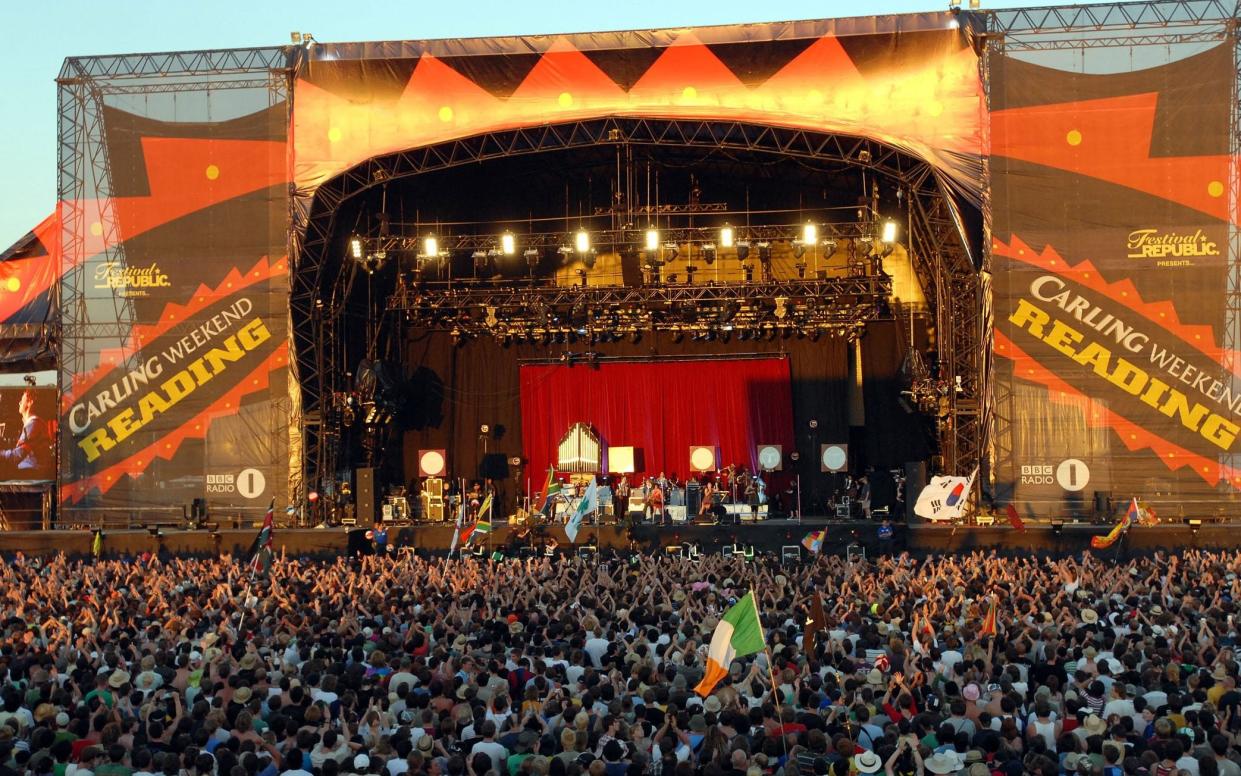What Reading & Leeds festivalgoers can expect this summer, from virtual GPs to health passports

Ticket holders for this summer’s Reading and Leeds Festivals who have not received the Covid-19 vaccine are likely to be required to take a coronavirus test at home prior to leaving for the events and will need to show a health passport to gain entry once they arrive, festival organiser Melvin Benn has told The Telegraph.
The probable system of entry to the music festivals, which take place over the August Bank Holiday weekend, gives the first indication of how large events will operate in the post-Covid world. Around a quarter of a million tickets for Reading and Leeds were sold between Wednesday morning and Thursday evening last week, Benn said, in a demonstration of the pent-up demand for live music.
Grime star Stormzy, rapper Post Malone and former Oasis frontman Liam Gallagher will headline. Another of Benn’s summer festivals – June’s heavy metal shindig Download – was cancelled today in a sign of just how tentative the return of live music is after a year of speaker stacks remaining unplugged.
The proposed plans will kick in unless the Government declares that nationwide herd immunity is in place. Under the system, Benn said that ticket holders who haven’t been vaccinated against Covid-19 will be sent a Covid test at home in the weeks prior to the Bank Holiday weekend. They will be required to take the test in front of a doctor on a computer screen between 24 and 36 hours before they’re due to leave for the festival. If the test is negative, the doctor will send them a QR code which will act as their health passport to grant them entry at the festival gates.
The virtual doctor’s appointment, which will last around three minutes, will need to be pre-booked by the ticket holder. The health passport will be specific to Reading and Leeds, and the test may cost participating ticket holders between £8 and £10, although Benn said the final price is still being worked out.
Benn said the move is part of his commitment to have “protocols in place to make sure that people are either tested or vaccinated”. Over half of all UK festivalgoers are under the age of 30 and will therefore be in the last cohort to be offered a Covid vaccine by the Government. However with all UK adults expected to have been offered the jab by 31 July, Benn anticipates that a “relatively small” number of people will require the tests and passports.
“The amount of lockdown that we’ve suffered is such an incentive [to get vaccinated]. And a lot of young people will go through vaccination programmes at school. They will also see that a vaccination is an opportunity to be free of their life of Zoom and staying in the house and parental watch,” Benn said.
Other measures in place at Reading and Leeds will include increased hand sanitation stations, teams of on-site medics to deal with anybody who has coronavirus symptoms, and emergency testing facilities within the festival walls. Specific Covid-19 medical directors will be appointed for each event, and if Government guidelines require face masks to be worn in certain situations then the festivals will adhere to these rules. Benn said he has a “duty of care” to all those who attend his events. Reading and Leeds will also benefit from the (hopefully) warm August weather and from taking place in the open air.
Benn, who is managing director of Festival Republic, said that final decisions are yet to be made on whether the Wireless and Latitude Festivals will still go ahead. Scheduled to take place in early and late July respectively, the festivals are among the biggest in the UK. Benn expects that Suffolk’s Latitude “will happen”, although he wants to be more certain of the route out of lockdown and needs clarity on whether the Government will underwrite the insurance (without which he says it won’t happen).
Meanwhile Festival Republic is “working hard” to make Wireless happen, albeit with the same insurance caveat. The two-day urban music festival in London’s Finsbury Park attracts around 49,000 people a day, and Benn said that attendees are not “beating about the bush” in telling him that they want it to go ahead. “The kids at Wireless are making it very clear to me that they’re expecting me to deliver. They’re not using the Queen’s English when they tell me they expect the event to happen. So, believe me, I am trying to deliver for them,” he said.
Around 250,000 day and weekend tickets for Reading and Leeds were sold between 11.30am last Wednesday, when Benn confirmed the events would go ahead, and 10pm on Thursday night, when they sold out. Although tickets have been on sale since last September, Benn said that the surge last week was “extraordinary”. With events like June’s Glastonbury already cancelled, Reading and Leeds will provide a chance for people to party en masse after 18 months of live music being muzzled due to Covid.
“It’s a real indicator of what lockdown is doing to young people, actually,” Benn said. “I think the line-up is terrific but the speed at which the tickets went and the amount of people that are looking for more tickets to be released – and there are no more tickets to be released – would suggest that people really really want to gather.”
Reading has a capacity of 105,000 people and Leeds has a capacity of 80,000. Bands too are chomping at the bit to play. “I got a call from the manager of one of the main American artists on the bill. He was unequivocal. He said, ‘It doesn’t matter what else is happening, Melvin. If Reading and Leeds are happening, we’re coming.’”

The precise look and feel of the August festivals is yet to be determined. Benn said that Festival Republic will learn from an upcoming series of pilot events that the Department for Culture, Media and Sport [DCMS] is holding to assess how large music and sport gatherings will happen. “There will be a whole number of pilot shows – music shows and sports shops, all sorts of gatherings of people – that will happen and we will all learn from. We’ll learn from the Premier League, the Premier League will learn from us, and the FA will learn from us. Because essentially we’re all in this together,” Benn said.
“I have to say, the DCMS are really grabbing this by the neck and saying ‘We are going to do all of these pilot shows and we are going to be on top of them so we can learn about what gatherings do in terms of the potential infection spread.’ And, equally, I know that the Government’s senior medical officers are talking to senior medical officers on mainland Europe in terms of pilot events they’re doing.”
And yet the issue of insurance remains unresolved. Live music insurance companies are simply not providing cancellation cover for Covid-19, so Benn and many other festival organisers have been calling for the Government to underwrite their insurance in case they’re forced to cancel at the last minute. “What I really want is a Government insurance scheme for everything, and what I know is that they’re reluctant to do that, so I need to keep that pressure on,” he said. All eyes will be on Chancellor Rishi Sunak during Wednesday’s Budget to see if he makes any announcement.
“Everything is about the insurance,” said Benn. “Without it we’re doomed.”

